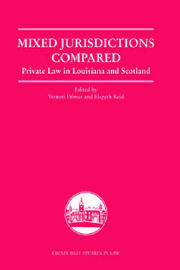Book contents
- Frontmatter
- Contents
- Preface
- List of Contributors
- List of Abbreviations
- Table of Cases
- 1 Praedial Servitudes
- 2 Title Conditions in Restraint of Trade
- 3 Servitudes: Extinction by Non-Use
- 4 Inheritance and the Surviving Spouse
- 5 Ownership of Trust Property in Scotland and Louisiana
- 6 The Legal Regulation of Adult Domestic Relationships
- 7 Impediments to Marriage in Scotland and Louisiana: An Historical-Comparative Investigation
- 8 Contracts of Intellectual Gratification – A Louisiana-Scotland Creation
- 9 The Effect of Unexpected Circumstances on Contracts in Scots and Louisiana Law
- 10 Hunting Promissory Estoppel
- 11 Unjustified Enrichment, Subsidiarity and Contract
- 12 Causation as an Element of Delict/Tort in Scots and Louisiana Law
- 13 Personality Rights: A Study in Difference
- Index
13 - Personality Rights: A Study in Difference
Published online by Cambridge University Press: 12 September 2012
- Frontmatter
- Contents
- Preface
- List of Contributors
- List of Abbreviations
- Table of Cases
- 1 Praedial Servitudes
- 2 Title Conditions in Restraint of Trade
- 3 Servitudes: Extinction by Non-Use
- 4 Inheritance and the Surviving Spouse
- 5 Ownership of Trust Property in Scotland and Louisiana
- 6 The Legal Regulation of Adult Domestic Relationships
- 7 Impediments to Marriage in Scotland and Louisiana: An Historical-Comparative Investigation
- 8 Contracts of Intellectual Gratification – A Louisiana-Scotland Creation
- 9 The Effect of Unexpected Circumstances on Contracts in Scots and Louisiana Law
- 10 Hunting Promissory Estoppel
- 11 Unjustified Enrichment, Subsidiarity and Contract
- 12 Causation as an Element of Delict/Tort in Scots and Louisiana Law
- 13 Personality Rights: A Study in Difference
- Index
Summary
INTRODUCTION
Over the past century, in both the Civil Law and the Common Law, the concept of “personality rights” has evolved to encompass that bundle of rights which protects the integrity and inviolability of the individual. Von Bar, for example, writing on European tort law, lists as personality rights the right to protection of life, and to be protected against injury to the body or health, and deprivation of liberty, as well as “the right to one's name, the right to one's image, and the right to honour and self-esteem”, and the right to protection against unlawful disclosure of personal information and interference with family life. A succinct working definition is found in the non-exhaustive listing in article 3 of the Quebec Civil Code:
Every person is the holder of personality rights, such as the right to life, the right to the inviolability and integrity of his person, and the right to the respect of his name, reputation and privacy. These rights are inalienable.
In summary, there are rights which “protect the attributes of the human person”, and thus concentrate upon “the être – the being – in contrast with the avoir – the having”. But while the category is recognised in both Scotland and Louisiana, and an abundant literature has formed on both sides of the Atlantic, there are significant variations – even within the Civil or Common Law groupings – with regard to the private law remedies by which personality rights may be vindicated.
- Type
- Chapter
- Information
- Mixed Jurisdictions ComparedPrivate Law in Louisiana and Scotland, pp. 387 - 410Publisher: Edinburgh University PressPrint publication year: 2009



